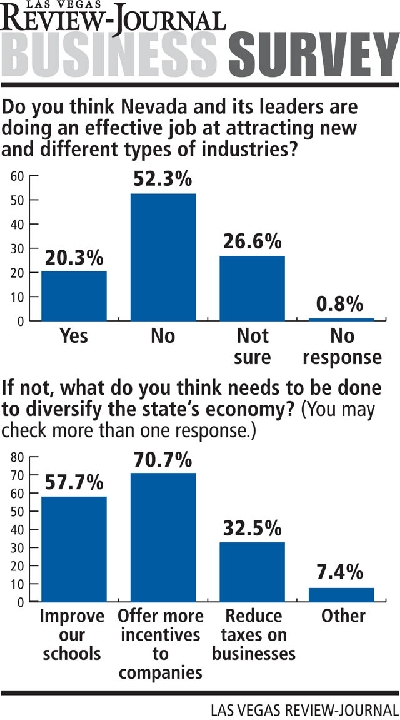Southern Nevada businesspeople agree diversity key to revival, poll shows
If Nevada needed a lesson on the importance of economic diversification, the recession delivered in spades.
Reliant on hospitality and construction for nearly half of its jobs base, the Silver State experienced steep revenue shortfalls and nation-leading joblessness when the downturn hit discretionary income and housing.
So it's no wonder that local professionals seem especially interested these days in the notion of transforming the state's two-trick economic pony into a more diverse commercial climate that could better ride out future recessions.
A recent online survey conducted by the Las Vegas Review-Journal found that most area businesspeople think the state needs more activity on the economic-development front, and survey respondents offered plenty of ideas on how to boost the number of businesses relocating or expanding to Nevada.
For Terri White, broker-owner of residential and commercial real estate firm Las Vegas Properties, injecting some variety into Nevada's business base should be priority No. 1 as the state struggles with a sustained downturn. White said she's helped some highly skilled locals sell their homes and move out of state after failing to find work here, and she believes a diverse economy would stanch that flow.
"Employment is the No. 1 issue we face, and it contributes to all of the other economic problems and challenges we face," White said. "Unless we can bring in new types of industries, and other types of jobs and employees, our growth is going to be limited."
Added Greg DeSart, president of local engineering company Geotechnical and Environmental Services: "It's a top issue. We've seen the effect when you have just one or two driving industries, in our case casinos and construction. We saw both of them take a steep dive in the recession. Without a strong, diversified economic sector, we are very vulnerable."
If local businesspeople agree on the need for economic development, they differ on whether the state's leaders have proven successful at attracting new types of industries to Nevada.
Just over half -- 52.3 percent -- of survey respondents said they don't think Nevada's leaders have been effective on the diversification side. Another 20.3 percent said they think the officials who spearhead economic development are getting it right. The rest weren't sure.
Count David Chavez, chief executive officer of business-coaching firm Assured Strategies, among those who said they think diversification initiatives could be stronger.
Chavez, a Las Vegas native who's been active in area chambers of commerce and economic development authorities, said he believes leaders are "trying to do a good job" with economic development, but they sometimes let obstacles get in the way -- failing to support incentives for new businesses if existing companies protest the perks, for example.
"I think there are people out there who are really trying to understand what the problem is and to create solutions, but I think sometimes they let bureaucracy get in the way, or they're letting relationships that have solidified dictate what happens, instead of looking at the common sense of what needs to happen," Chavez said. "I think they're also trying to protect their position, and they sometimes don't open their mind up and understand there's more that could be done out there."
And though DeSart thinks groups such as the Nevada Development Authority have been "very effective" at drawing new businesses, he thinks such private groups could use help from state government. He called Gov. Brian Sandoval's task force on economic diversification a good idea.
Nor do local professionals agree on a single formula for luring diverse companies.
Given three options on how to attract diverse companies, 70.7 percent of respondents said offering more incentives to companies would help, though that could be a tall order in a state with constitutional prohibitions on the types of aid that businesses can collect from public coffers.
Improving local schools captured 57.7 percent of the vote (participants could select more than one choice). And 32.5 percent said it's important to reduce taxes on businesses.
White said she falls squarely in the taxes-and-incentives camp.
She said she's not against improving schools, but in her experience, corporations don't consider school quality a bottom-line issue.
"Whether through a property-tax rebate or a tax credit for jobs or production created, I think it's all about incentivizing businesses in a way that reduces their costs, therefore increasing their potential profit," she said.
DeSart also cited the importance of incentives, though he'd like to see such inducements focused on specific kinds of businesses. The federal government owns nearly 90 percent of Nevada's land, and that means the vast majority of the Silver State's territory is off-limits to much private development and the tax collections that would follow building out the land, DeSart noted. The state's government and business leaders should explore ways to generate revenue from those federal lands, perhaps through alternative-energy projects such as solar-power plants and geothermal wells.
Incentives could also go toward existing businesses that diversify the products and services they offer -- for example, the heating, ventilating and air-conditioning contractor who adds a division specializing in retrofitting homes for improved energy efficiency, DeSart said.
Schools loom largest on Chavez's radar. Taxes and business costs rank a close second.
"When I talk to people in San Diego, where I have an office, about moving to Las Vegas, one of their biggest concerns is the schools," he said. "Their second-biggest concern is taxes. They say, 'You guys have been jacking up your taxes so fast that we're worried Nevada's going to become like California.' "
Though they appear at first glance to be separate issues, schools and taxes go hand in hand, Chavez said.
"I think the most important thing is to improve the schools, but I feel that most business owners are not willing to give any more money until we clean up the cost problem," Chavez said.
Chavez said he's especially concerned about administrative and benefit costs inside local schools.
"We're disenchanted. We keep throwing money at the problem," he said. "I agree teachers need to make a good salary so we can get the right people involved, but some of these costs have gotten so out of control that we've lost sight of what's really important."
Ultimately, attracting new businesses will require removing old barriers, including a culture that makes it difficult to grant incentives except to a relatively few new companies.
"One of the biggest problems is, everyone is trying to scratch everyone else's back," Chavez said. "Some people's backs aren't going to get scratched. We don't have money for that anymore. We need to look at the problem objectively and solve it like a business would. When businesses are running into the ground, they quit worrying about appeasing everybody. They just try to save the business, and help the people who really need help."
Existing businesses must also help out, working through diversification agencies to take a more active role in talking with companies from out of state about their concerns, Chavez said.
"All of us can do our part with economic diversification," he said.
Contact reporter Jennifer Robison at
jrobison@reviewjournal.com or 702-380-4512.
ABOUT THE SURVEY
The Review-Journal asked local businesspeople to participate in a wide-ranging survey in December and January. The questionnaire asked area professionals for their opinions on issues such as the local economy’s prospects in 2011, expectations for the upcoming state legislative session and how to improve local schools. Nearly 1,000 people responded.
Additional stories in our survey series:
• Jan. 23, Review-Journal: Local professionals share their forecasts for the Las Vegas economy in 2011
• Jan. 24, Review-Journal: Area managers and business owners discuss hiring and compensation plans for the year
• Jan. 25, Review-Journal: Participants talk about what policies they’d like the state Legislature to tackle when their session begins in February
• Jan. 26, Review-Journal: As Congress debates whether to repeal federal health insurance reform laws, we’ll ask local businesspeople for their thoughts
• Jan. 27, Review-Journal: How would area professionals suggest improving local schools?


















